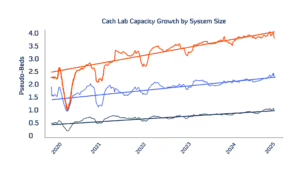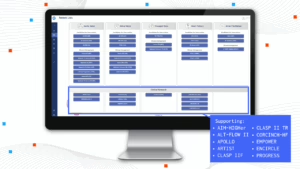egnite, Inc. expands technology to improve the quality of care for heart failure patients
New data from egnite demonstrates opportunity to improve survival and reduce readmission rates for heart failure patients
ALISO VIEJO, Calif. – November 1, 2021 – Advancing its application of artificial intelligence and data science to help improve patient care, today egnite, Inc. expanded into heart failure for its flagship solution, CardioCare. This expansion leverages real-world insights to help physicians identify at-risk patients with heart failure and a reduced ejection fraction (HFrEF) who are not on guideline-directed medication and could benefit from timely intervention.
Early data from five heart programs managing more than 50,000 HFrEF patients indicate the 3-year survival rates for HFrEF patients prescribed 0 or 4 guideline-directed medications were 56% and 95% respectively. Thirty-day hospital readmissions for HFrEF patients prescribed 0 guideline-directed medications were three times higher than patients prescribed 4 medications, at 18% and 6% respectively.
These real-world insights from the CardioCare platform indicate an average of only 2.48% HFrEF patients are prescribed all 4 guideline-directed medications to manage their disease. “These data demonstrate significant opportunity to help improve survival and reduce readmission rates for heart failure patients,” said Joel Portice, chief executive officer, egnite. “CardioCare’s first to market technology helps hospital systems understand and improve the care for these large heart failure patent populations.”
Today, CardioCare is partnered with over 50 heart programs to reduce variability in care and improve guideline-directed treatment for patients with heart valve disease. This expansion into heart failure is the first of many for CardioCare as egnite continues its pursuit to elevate the standard of structural heart patient care by bringing leading-edge technologies to hospital systems.
“Healthcare information is moving rapidly with estimates of doubling five times a year. Data-driven population health initiatives like this are imperative to assist providers in managing their patients to the highest level of guideline-based care, the foundation of heart failure management. This work will improve patient management, quality of care, and save lives.” John Mignone, M.D., Ph.D., Robert M. and Patricia Arnold Endowed Medical Director for Heart Failure and Co-Executive Medical Director Swedish Heart and Vascular Institute.
About egnite
egnite is a digital health company focused on providing artificial intelligence solutions to help hospitals identify and manage their most at-risk patients. The company is a market leader in structural heart solutions with a vision to improve the outcomes for every structural heart patient in America. egnite’s flagship AI platform, CardioCare, has partnered with over 50 hospitals nationwide and leverages the program’s big data analytics platform of over one million echocardiograms to elevate the standard of patient care. The company is based in Aliso Viejo, Calif., for more information, visit www.egnitehealth.com.
To view the official release on Business Wire, please click here.
The CardioCare platform is not intended for use in the diagnosis, cure, mitigation, treatment, or prevention of structural heart diseases.
egnite, egnite, Inc., the spark logo, and CardioCare are trademarks of egnite, Inc. All other trademarks are the property of their respective owners.



